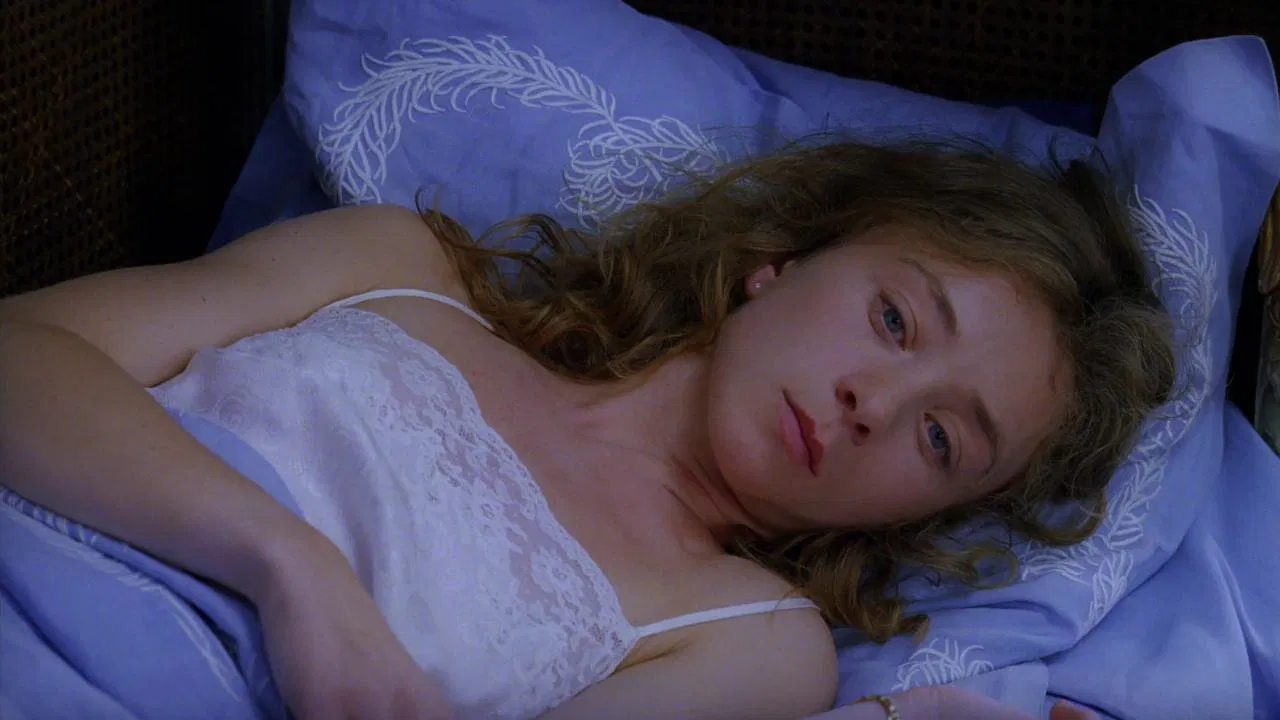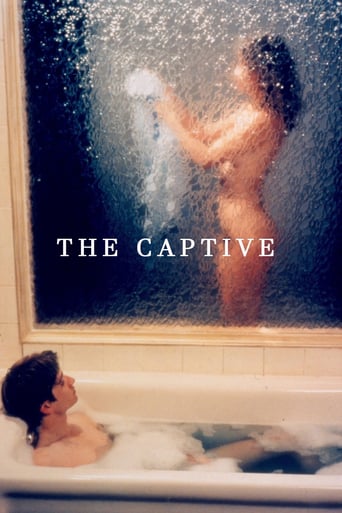WasAnnon
Slow pace in the most part of the movie.
Humaira Grant
It’s not bad or unwatchable but despite the amplitude of the spectacle, the end result is underwhelming.
Melanie Bouvet
The movie's not perfect, but it sticks the landing of its message. It was engaging - thrilling at times - and I personally thought it was a great time.
Staci Frederick
Blistering performances.
Aerig Meginlu
At the start I found this film very slow and I think anyone would who did not appreciate its nature before watching it.It's easy in this one to be put off with the almost entirely gloomy settings, however, they are part of the film and, as you begin to appreciate what the film is actually about, they make a lot more sense.The film is not about a plot or a story, it is about the people in it. Nor does it tell you what it is about the people that you are meant to see. So this film is very much for the viewer who likes to watch, observe, think and conclude.You basically get a very slow and moody perspective on a strange(?) boy girl relationship. The interaction between them is never really explained until right up till the end, so it's a case of watching and wondering what is going on between them.Apparently uneventful, I found myself being slowly drawn into, seduced by, their romance, question being stacked on question till I did really feel a bit frustrated.However, in the last 30-40 minutes this film suddenly becomes alive and you begin to understand what the point of it was. The point is very poignant and sad and would never have been put across had the earlier 3/4 of the film not been so 'uneventful'.If you like poetry, you will probably like this film. It has you wondering and speculating right up to the last stanza when you then realise the point of what came before. It is a very sad but beautiful poem.
Howard Schumann
Because of its complex and introspective nature, the works of the great French novelist Marcel Proust have been difficult to translate to the screen in spite of some very fine attempts by Raul Ruiz and others. Chantal Akerman's La Captive is no exception. Inspired by the fifth of seven volumes of Proust's epic novel In Search of Lost Time, the film captures the obsessive quality of the relationship between Simon (Stanislaus Merhar) and Ariane (Sylvie Testud) (Marcel and Albertine in the novel), but is unable to project onto the screen the novel's exquisite prose, psychological subtlety, or depth of feeling. While Simon is given a thoughtful treatment, he comes across more as strange and unpleasant than the deeply sensitive, poetic young man of the book.La Captive begins at home with Simon viewing films of Ariane and some friends during their summer together in Normandy. Repeatedly viewing the footage, he carefully utters the words "I really like you," but it is unclear if the sentiment is his, or if he is vocalizing what he imagines to be the thoughts of his mistress. Set in Paris, Akerman updates the story from its turn of the century milieu and transports it to the modern era with automobiles and well-lit boulevards filled with traffic replacing the horse and carriage. Simon is a somber, well-to-do young man who lives in an ornate Paris apartment with his grandmother (Francoise Bertin), housekeeper Francoise (Liliane Rovére), and girlfriend Ariane (Sylvie Testud).Though they claim to love each other, each keeps their distance. Ariane lives in an adjacent room and only comes to see Simon when he sends for her in an ongoing ritual. Dialogue is sparse and mostly consists of Simon asking Ariane questions that elicit noncommittal responses such as "if you like," "I can't say," or "you think so?" Mimicking Bressonian models, the actor's facial expressions range from enigmatic to blank, and, aside from some perfunctory kissing, the only time that passion shows up is when Simon rubs up against Ariane's body while she is asleep (or pretending to be). When Simon demands to know what Ariane is thinking, she replies, "If I had any thoughts, I'd tell you—but I don't." Some situations would be comical if they were not sad. As Simon watches Ariane from an adjoining bathroom while sitting in his tub, he tells her how much he admires the odors between her legs and says that if it weren't for his illnesses, he would rather that she would never wash. On another occasion, he probes to find out the number of lies she has told him, insisting that two lies are not enough, he wants at least four. The jealous and insecure Simon has accumulated evidence in his own mind that Ariane is physically attracted to women but it is not made clear (either in the novel or the film) whether his suspicions are real or imagined.Nonetheless, Simon is preoccupied by the part of Ariane's life that he believes she is withholding from him, following her in an art gallery and physically removing her from a performance of Carmen at the Trocadero out of his fear of her friendship with the actress Lea (Aurora Clément). When Simon is unable to leave the house because of an asthmatic condition, he assigns their mutual friend Andrée (Olivia Bonamy) to track her whereabouts and report back to him. He even goes so far as to question lovers Sarah (Bérénice Bejo) and Isabelle (Anna Mouglalis) about what they think about when they make love.Although the characterizations in La Captive are very real and quite haunting, the film covers only a small portion of Proust's fifth volume, omitting the colorful characters that make it so special: Charlus, Morel, the Verdurin's, Brichot, and Mme de Guermantes to name a few, and there is no hint of the music, society, and themes of memory, nature, and awareness of time and place that dominate the narrative. Though the pacing is deliberately slow to capture the enigmatic quality of the relationship, the film, while absorbing, is static and does not draw us deeply enough into its mysteries to compensate for its dramatic inertness.
sonnenberg
I'm currently studying Proust, and so looked forward to this. I figured the other review HAD to be wrong about how bad this was. But they weren't! I love slow, ponderous French movies. But this one absolutely killed me, bludgeoned me with a big fat dull fence post and left me by the side of one of the many long roads I'd watched the actors drive interminably and wordlessly down. I finally had to watch it on fast forward, because NOTHING HAPPENS time and time and time again for minutes at a stretch. I don't envy a director/scriptwriter who takes Proust on, because so much of the richness of his characters and stories is interior. But, God! You've got to at least TRY to convey those depths by something other than static shots of actors doing and saying nothing. Boo. Hiss. Just awful.
Alice Liddel
'La Captive' is, above all, a detective story. It opens, in scenes reminiscent of 'Vertigo', with a man following the movements of a woman later revealed to be his lover. It actually opens with him looking at her in a home video as she sits on the beach with her friend Andree. He tries to make out what she's saying, and the whole film is his attempt to read and interpret this woman, this so-called captive (the next book in Proust's 'In Search of Lost Time' is called 'The Fugitive').The first word he says, though, as he watches this video, is 'je', 'I', and this is the crux of the mystery. Is he reading her with too much 'I', too much subjective misinterpretation, to the point where her personality is literally squeezed to nothing (her name is changed from Proust's Albertine to Ariane = a rien), vanishing from the film? Or is it her 'I' that Simon tries to solve, as he sets himself the impossible task of fully possessing, fully knowing another person? Who is Ariane's 'je vous aime bien' referring to - Simon or her friend sitting beside her? The title refers to a female captive, but the real prisoner here is Simon, wandering in a labyrinth of jealousy, suspicions, half-clues and lies.When a great filmmaker films a great book, it is instructive to note what she has left out as much as she leaves in. 'La Prisonniere' (why the name change?) is the fifth book in Proust's giant novel, but those thousands of pages of Proustian backstory are absent, the tortured obsession of the narrator with Albertine, his alarmed discovery of different sexualities (repressing his own?), his past (no madeleines here!), his desires, his art, his self-justifications. Indeed, where Ruiz's 'Le Temps Retrouve' is as close to Proustian FULLNESS as we are likely to get, 'La Captive' is Proust without the Proust. Set in a sort of timeless present (modern dress, period locations and mores), where Proust glides in a liberated chronology, 'La Captive' discards tastes, smells, music, comedy, society (no Charlus!), nature, time.Proust's 'La Captive' is on one level even more suffocating than this film, filled largely with the agonisings and imaginings in the head of one man who never leaves his room - are Simon's wanderings here mental peregrinations, explaining the film's air of unreality? About halfway through the book, the reader is given blessed relief with a 100-page musical soiree, which opens it from the private to the public, the analytic to the observational, the tragic to the comic. This is completely absent here, as Akerman goes for a relentless narrative of cat-and-mouse jealousy reminiscent of Chabrol's 'L'Enfer', pushed so solemnly that it eventually becomes comic.
Similarly, the underlying, organising motif of the book, music, linking the narrator's awareness and transcendence of his locale, his memories of his past, his ideals for art, and Albertine, are mostly gone, making the film much more austere, and also minimising Albertine/Ariane (one exception is the beautiful sequence where Albertine and a neighbour , both birds behind cages, sing 'Cosi Fan Tutti' (women are all like that - captives?) to each other from their balconies, a breath of fresh air in their stifling lives, from another tale (like 'Vertigo' of women subjected to dangerous and repressive male jealousy).It seems strange that Akerman should choose to follow Proust's narrative trajectory, emphasising mad male obsessiveness, rather than somehow rescuing Albertine, who is as indistinct here - as an ephemeral construct in Simon's mind - as in the book. Even her final gesture of liberation is denied, with the suggestion that Simon has killed her, his 'I' literally submerging her in the beach from which, in that opening video, she emerged.Akerman's procedures are very similar to those of d'Oliveira's 'La Lettre', another transposing of an alien past to modern dress, where the cultural codes are not adapted, and hence jar, making us ask questions about the director's seemingly capricious intentions. The incongruity between the glossy imagery and the austere narrative creates a compelling mystery beyond that of plot, also reminiscent of Phillipe Garrel's 'Le vent de la nuit'. Still, I'll take Proust or Ruiz anyday. Pseuds may be interested to know that one of the machinistes was a certain Christian Metz.

